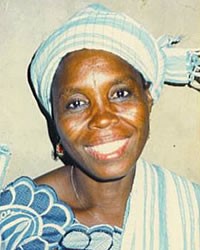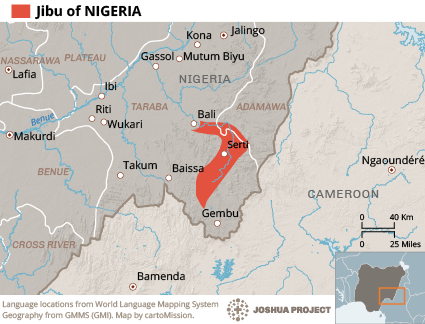Nigeria can be seen as composed of three geographic divisions: Southern, Middle, and Northern. The Jibu live in the extreme eastern part of the middle belt. Their area was a part of Cameroon at one time. The two major towns are Serti and Beli. There are well over 100 villages, each with a village chief. Many of the villages are situated on the north or western side of the Taraba River. Many other villages are located father to the northwest either along creeks or in valleys in that hilly/mountainous area. In the swift running creeks live a tiny fly which causes river blindness. There is much river blindness among the Jibu. Recently there have been campaigns to eradicate the disease.
All village chiefs are appointed by the paramount chief, who is a Fulani. He considers the Fulani to be superior to the Jibu, and thus always favors the Fulani when there is a dispute between the Fulani cattle herders and Jibu farmers.
Most of the Jibu are farmers. The main crop is guinea corn; they also raise corn, bananas, and to a smaller extent rice and peas. All the farming is done by hand-digging the soil and making it into rows with shovels made by local blacksmiths. They do not own cattle or horses. The soil is not fertile at all and it has become very difficult for the farmers to obtain the fertilizer needed to grow their crops. They also gather edible leaves of various kinds from the woods. There are at least 16 kinds of mushrooms. The older women are good mushroom hunters and they easily distinguish which are edible and which are poisonous.
The Fulani cattle sometimes destroy the Jibu crops. Since the paramount chief is Fulani, the people don't receive any remuneration for the damaged crops.
The people live in small mud houses with grass roofs. If the family is large, there will be several huts. The kitchen is an open house with just a grass roof and usually sits in the middle of the other huts. Most homes have several big clay water pots for carrying water from the river or creek, and for storing the guinea corn drink. All the vessels are made by the women. There is one village that is famous for its pottery because it has the right kind of clay. All of the family help with the farm work.
Until recently, few Jibu children attended school. The schools are conducted in Hausa and English which made it difficult for the children as they speak Jibu. Also the parents were not much in favor of the children going to school as they are needed to help on the farms. But the literacy program started a few years ago has greatly increased the interest and reading ability of more and more people.
Books, including the New Testament, primers, reading books, fun books, trilingual dictionary, etc. have greatly enhanced the reading ability of most young people.
The traditional wedding begins with the groom approaching the girl's parents, asking their consent. If they agree they will ask a bride price. The two families have to agree to the marriage and then a date is set for the girl to go his village. When the time comes for her to go, she will be escorted by several of her female age mates. She will show great sadness and even run away and hide. This is seemingly to honor her parents, pretending she doesn't want to leave them. But she always hides where she can easily be found. The wedding ends when she arrives and there is a feast with his family.
When a Jibu person dies, he is buried as soon as possible. In a typical burial, the men dig the grave, while the women sit together at a distance. After the corpse is buried, the men chop up a gourd vessel and scatter the pieces on the grave. This is a warning to people "If you don't respect and help the deceased's family, you won't last any longer than the gourd did." Then a hole is made in an earthen pot and laid upside down on the grave. This is a reminder that the deceased person will be reincarnated in the first baby born in the village whose fontanel is pulsating. Next the men go to large pots of water to wash their bodies well "to keep death from going home with them." Then they go to where the women are waiting to receive the "thank-you" An older woman will prostrate herself on knees and elbows, and clapping her hands the whole time will thank the men over and over for doing the unpleasant task of burying the dead.
The religion of Jibu is called "buki", which means "thing of death." It is a mixture of rituals, putting curses on enemies and removing curses by paying shamans. They have rituals to placate the rain god, river god, mountain god, etc. Men and women differ in the way they do buki. The men go as a group to sacred spots high in the hills to do buki. The rituals include slaughtering chickens and pouring out guinea corn beer as sacrifices to the gods. Women never see the men doing buki. Occasionally the men do buki close to the village. During this time the women and children are required to stay in their huts. The belief is that if they see the rituals, they will die or go crazy.
In past generations, Islam has been forced on the Jibu people. Most of those who profess Islam do not understand its teachings well, but continue to profess Islam as it offers more government jobs, better education, and other benefits.
During the past dozen or so years, the Christian population has increased greatly. Churches are being started in many villages. There are more than a dozen men, mostly young adults (20 to 40 years old) who pastor, evangelize and encourage the believers.
The Jesus film was produced in 1998, and along with other Scripture on tape, has been well received and distributed.
New equipment has been purchased for showing the Jesus film, and the film is now on DVD. The evangelists have been showing it in many villages, and report very good response.
Two new churches have been built, but lack funds for purchasing the roofing.
Pray for the annual Jibu Christian conference held each Spring.
They have received some opposition from neighboring Christians who want them to minister in the Hausa language rather than in their mother tongue of Jibu.
A Jibu man who accepted Christ several years ago, has now returned to his Muslim religion and has been visiting the Jibu Christians to turn them away from the Gospel. The leading chief of the area is encouraging him to do this.
The opportunity to have the Jibu New Testament put on tape has been offered. Since many of the older Jibu do not read, this would be a tremendous tool for evangelism and growth for believers.
Scripture Prayers for the Jibu in Nigeria.
| Profile Source: Perry Priest |











